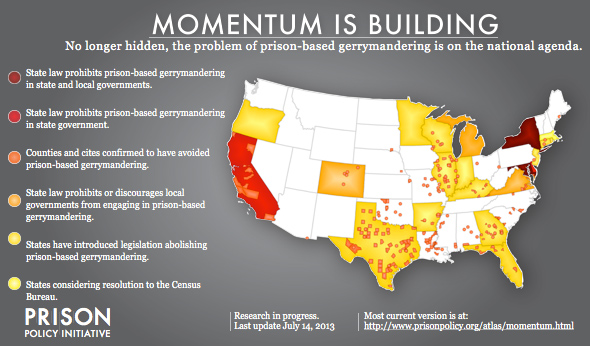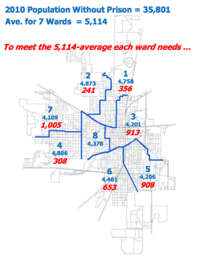by Aleks Kajstura,
November 27, 2012
Peter Wagner, our executive director, is in Kentucky today testifying about BR 219, a bill to end prison gerrymandering, before the Kentucky General Assembly Task Force on Elections, Constitutional Amendments, and Intergovernmental Affairs. In addition to explaining how prison populations in redistricting data distort state legislative districts, Peter will highlight how Kentucky counties grapple with prison gerrymandering when drawing their magisterial districts. For more information about prison gerrymandering in Kentucky and how you can get involved, check out our Kentucky campaign page.
Ever since redistricting season started, we've been researching how local governments across the country have handled the problem of prison-based gerrymandering. Our results? A clear trend away from prison-based gerrymandering.
by Leah Sakala,
November 26, 2012
How do officials in cities or counties that contain large prisons draw their electoral districts? Do they accept Census Bureau data that inflates the population of the area containing the prison, or do they reject the Census Bureau’s prison counts in order to draw fair districts?
We’ve been reaching out to cities and counties across the country, first to bring the problem of prison-based gerrymandering — and the solutions — to their attention, and then more recently following up to see what they did. We’re happy to report that we’ve found that most of these cities and counties exclude the prison populations in order to give all of their actual residents the same access to government.
Just the other day, we hit a big milestone in the project when we verified the 200th county or city to refuse to engage in prison-based gerrymandering: Prison Policy Initiative Legal Director Aleks Kajstura found that Howard County, Texas refused to use the 5,000+ people in private and federal prisons when drawing its new County Commissioner precincts. Had county officials engaged in prison-based gerrymandering, the First Precinct would have been more than 60% incarcerated, giving every four residents of that precinct the same influence as ten residents in any other parts of the county.
This milestone in our research is further evidence that the national trend away from prison-based gerrymandering is gaining momentum. And even more exciting is the fact that 200 is a significant underestimate of the number of local governments that avoid prison-based gerrymandering. We know that the actual number is much higher, in part because we’re still calling counties and because redistricting is not yet complete in some locations, but especially because we’ve largely skipped following up in states that require counties and municipalities to exclude prison populations. Instead, we’ve focused on the places that must independently choose whether or not to avoid prison-based gerrymandering. And there, the trend is clear: prison-based gerrymandering is on the decline.
To celebrate reaching 200, we’ve updated our map of national progress towards ending prison-based gerrymandering:

These 200+ communities deserve the credit for finding creative solutions to the unexpected problems caused by the Census Bureau’s archaic method of tabulating incarcerated people. Unfortunately, often unknowingly, many other communities used census counts of prison populations to dilute the votes of most of their own residents. Hopefully the Census Bureau will update its methodology and present the country with a national solution by counting incarcerated people at home in 2020.
While President Obama is hoping for a victory in Ohio on Tuesday, Lima residents have already won a democratic victory of their own over the problem of prison-based gerrymandering.
by Leah Sakala,
November 2, 2012

As you’ve probably noticed, I’ve been keeping close tabs recently on the presidential candidates’ travel itineraries. As they jet around the country to drum up votes in Tuesday’s election, they keep making campaign stops in cities and counties where prison-based gerrymandering presents a major democratic challenge.
This afternoon, President Obama will be speaking to a crowd of voters in Lima, Ohio. While the president is hoping for a victory in Ohio on Tuesday, Lima residents have already won a democratic victory of their own over the problem of prison-based gerrymandering. For more than two decades, officials in the City of Lima have refused to pad their city wards with the populations of the two state prisons located within city limits.
As Board of Elections Director Keith Cunningham explained, the decision to exclude incarceration populations makes sense because “prisoners have no communications, no voting rights, and are not a constituency.” If city officials had not adjusted the 2010 Census data by removing the prison populations for redistricting purposes, about half of the population in Ward 1 would have been made up of people in the state prisons. By avoiding prison-based gerrymandering, the city ensured that the actual residents of Ward 1 were not granted twice the voting power of any resident in the other six districts.
So, although Obama may not mention prison-based gerrymandering this afternoon, the City of Lima has a strong history of maintaining a healthy democracy. And on Tuesday, Lima voters will have the opportunity to exercise it again.
The state needs to take action to ensure that phantom constituents don't continue to distort local democracy.
by Leah Sakala,
November 2, 2012
As the number of undecided voters wanes in the week before the presidential election, the candidates are making a last push to garner support in swing states. Earlier this week, vice presidential candidate Paul Ryan returned to his home state of Wisconsin to rally for the Romney ticket and to go trick or treating with his kids. But when he rallied in Racine, Wisconsin on the afternoon of Halloween, the voters had more to be scared of than just a spooky holiday. While Racine voters should carefully consider who to vote for in the national election next Tuesday, they should also be concerned about the phantom constituents in their midst that are skewing local democracy.
These phantom constituents were created when the county redistricted based on Census data that counted the people locked up in several state prisons as though they were actual residents of Racine County, rather than in their home communities. As as result, nearly one-fifth of District 14 can only be found by looking behind bars and the real residents of District 14 reap the extra political clout from the phantom constituents. Each vote cast in District 14 is 19% more powerful that a vote cast in another district. Consequently, everyone else’s vote is worth less.
At redistricting time last year, Racine County Supervisor Ken Lumpkin was certainly worried about counting incarcerated people as county constituents. As he pointed out, “It’s unfair [that prison populations] are utilized in the census count. They are not active participants in the community.” In the end, though, the prison population was left in the redistricting data despite Supervisor Lumpkin’s concerns.
Fortunately, the Supreme Court’s recent endorsement of Maryland’s law ending prison-based gerrymandering has given Wisconsin legislators the green light to move forward on a state-wide legislative solution. By passing a bill to end prison-based gerrymandering in state and local districts, Wisconsinites would be able to rest assured that phantom constituents don’t haunt elections for decades to come.





